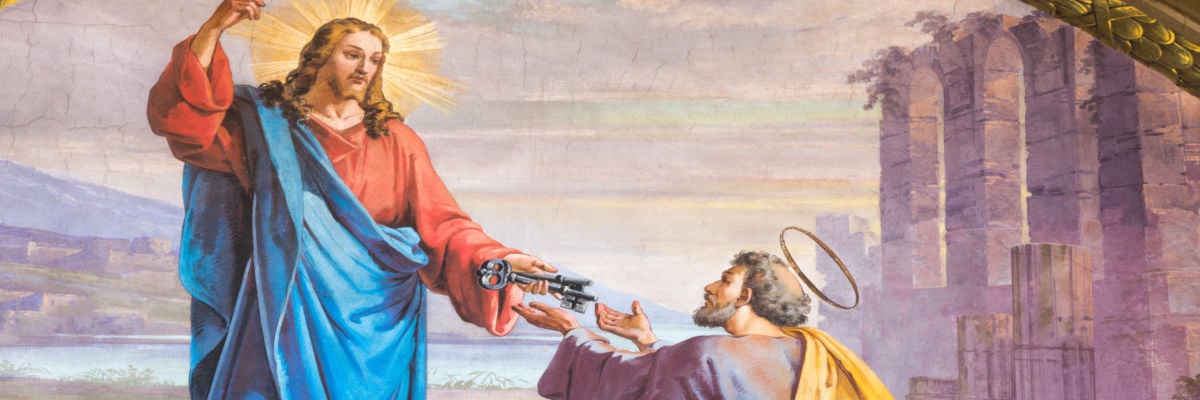
Episode 74: Year B – 4th Sunday of Easter, Good Shepherd Sunday
There are three details that we highlight in the readings for this upcoming 4th Sunday of Easter, Year B, also called Good Shepherd Sunday. The first two details come from the first reading, taken from Acts 4:8-12. The relevant apologetical topics are Peter the Rock (and thus the Papacy) and Jesus’ divinity. The third detail is the major theme of the Gospel—Jesus the Good Shepherd. The passage is John 10:11-18. The apologetical topics that come to fore with this theme is Jesus’ divinity and Peter’s role as the first pope.
The Readings: Click Here
Looking for Sunday Catholic Word Merchandise? Look no further! Click Here
Hey everyone,
Welcome to The Sunday Catholic Word, a podcast where we reflect on the upcoming Sunday Mass readings and pick out the details that are relevant for explaining and defending our Catholic faith.
I’m Karlo Broussard, staff apologist and speaker for Catholic Answers, and the host for this podcast.
There are three details that we’re going to highlight in the readings for this upcoming 4th Sunday of Easter, Year B, also called Good Shepherd Sunday. The first two details come from the first reading, taken from Acts 4:8-12. The relevant apologetical topics are Peter the Rock (and thus the Papacy) and Jesus’ divinity. The third detail is the major theme of the Gospel—Jesus the Good Shepherd. The passage is John 10:11-18. The apologetical topics that come to fore with this theme is Jesus’ divinity and Peter’s role as the first pope.
Let’s get started with the first reading. Here’s what Peter declares in Acts 4:8-12:
Peter, filled with the Holy Spirit, said:
“Leaders of the people and elders:
If we are being examined today
about a good deed done to a cripple,
namely, by what means he was saved,
then all of you and all the people of Israel should know
that it was in the name of Jesus Christ the Nazorean
whom you crucified, whom God raised from the dead;
in his name this man stands before you healed.
He is the stone rejected by you, the builders,
which has become the cornerstone.
There is no salvation through anyone else,
nor is there any other name under heaven
given to the human race by which we are to be saved.”
As I mentioned, there are two details here that I want to focus on. The first is Peter’s application of Psalm 118:22 to the current situation: “[Jesus] is the stone rejected by you, the builder, which has become the cornerstone.”
Some Protestants appeal to this passage as evidence that Peter is not the “rock” upon which Christ promises to build his Church in Matthew 16:18. If Jesus is the cornerstone, so it’s argued, then Peter can’t be the rock.
Now, I’ve already addressed this objection in episode 46 of the Sunday Catholic Word, which was the episode for the 27th Sunday of Ordinary Time, Year A. Rather than repeat the same thing here, I recommend that you listen to that episode if you want the details on how to respond to this objection. I also deal with it in my book Meeting the Protestant Challenge and Meeting the Protestant Response.
The second detail worthy of note in this passage is Peter’s declaration, “There is no salvation through anyone else, no is there any other name under heaven given to the human race by which we are to be saved.” This is apologetically significant because Peter here quotes Joel 2:32, which reads, “There is no salvation through anyone else, nor is there any other name under heaven given to the human race by which we are to be saved.”
The name that Joel refers to, of course, is Yahweh’s name. For Peter, that passage refers to Jesus’ name. How could Peter say such a thing unless he believed Jesus was Yahweh, almighty God.
Furthermore, the salvation that Joel speaks of is temporal salvation. Peter applies the text to spiritual salvation, which further drives home the point that he believes Jesus is God, since only God can give such salvation.
Let’s now turn to the Gospel that grounds this upcoming Good Shepherd Sunday, 4th Sunday of Easter: John 10:11-18. Jesus says,
I am the good shepherd.
A good shepherd lays down his life for the sheep.
A hired man, who is not a shepherd
and whose sheep are not his own,
sees a wolf coming and leaves the sheep and runs away,
and the wolf catches and scatters them.
This is because he works for pay and has no concern for the sheep.
I am the good shepherd,
and I know mine and mine know me,
just as the Father knows me and I know the Father;
and I will lay down my life for the sheep.
I have other sheep that do not belong to this fold.
These also I must lead, and they will hear my voice,
and there will be one flock, one shepherd.
This is why the Father loves me,
because I lay down my life in order to take it up again.
No one takes it from me, but I lay it down on my own.
I have power to lay it down, and power to take it up again.
This command I have received from my Father.
The key detail here is Jesus’ declaration in verse 11, “I am the good shepherd.” There are couple of Old Testament prophecies that shed light on what Jesus is revealing here.
The first is Ezekiel 34:11-17, where God describes himself as the shepherd gathering his flock unto himself, and judging “between one sheep and another, between rams and goats.”
Jesus clearly sees himself fulfilling this prophecy in Matthew 25:46 when he identifies himself as the judge judging between sheep and goats at the final judgment. But he also indicates he is the fulfillment of the prophecy here in our Gospel reading when he says, “I am the good shepherd.”
Notice Jesus says he’s “the” good shepherd. The definite article is in the Greek. He’s not just a shepherd. Rather, he’s the shepherd. But for a Jew, Yahweh is “the” shepherd. Jesus, therefore, is claiming to be God.
Moreover, in verse 16 of John 10, Jesus speaks of some of his sheep that are scattered and how he will bring them into the fold: “I have other sheep, that are not of this fold; I must bring them also, and they will heed my voice. So there shall be one flock, one shepherd.” In Ezekiel’s prophecy, Yahweh speaks of bringing in scattered sheep: “The lost I will search out, the strays I will bring back.”
Jesus’ description of himself as the good shepherd, therefore, is a claim to be the Jewish God.
The second Old Testament prophecy that’s relevant to Jesus’ claim to be the good shepherd is Isaiah 40:9-11. Here, Isaiah prophesies about “the gospel,” or the euangelion, stating,
[9] Get you up to a high mountain, O Zion, herald of good tidings [Gk., euangelizomenos]; lift up your voice with strength, O Jerusalem, herald of good tidings, lift it up, fear not; say to the Cities of Judah, “Behold your God!”… the Lord GOD comes with might, and his arm rules….[11] He will feed his flock like a shepherd, he will gather the lambs in his arms, he will carry them in his bosom, and gently lead those that are with young.
Notice it’s God who is the shepherd feeding his flock, gathering the lambs in his arms, and leading them. In light of this prophecy it becomes clear what Jesus is claiming about himself when he says, “I am THE good shepherd”: he’s saying he’s God.
So, the good shepherd theme reveals Jesus’ self-understanding of being divine. But there’s another apologetical topic that this theme evokes: Peter’s role as the first pope.
Consider Jesus’ statement in verse 16, “I have other sheep that do not belong to this fold. These also I must lead, and they will hear my voice, and there will be one flock, one shepherd.” The “one shepherd” here ultimately refers to Jesus. But it can also be applied to Peter.
The “other sheep” not of Jesus’ fold refers to the Gentiles. So, Jesus is prophesying of a time when both Jews and Gentiles will be within his fold guided by one shepherd.
Who initially brought the Gentiles into Jesus’ fold? It was Peter. In Acts 10, Jesus reveals to Peter that the Gentiles are allowed to be members of his flock. And this is visibly manifested by the Spirit being given to Cornelius, a Gentile, and his friends.
In Acts 11, Peter goes to Jerusalem to describe to the circumcision party the things that had transpired with the Gentiles and we’re told they glorified God, saying in verse 18, “Then to the Gentiles also God has granted repentance unto life.”
Then, in Acts 15:7, at the council of Jerusalem, Peter definitively declares that the Gentiles can be saved by God’s grace apart from circumcision.
This shepherding role of Peter was initially promised to him in John 21:15-17:
When they had finished breakfast, Jesus said to Simon Peter, “Simon, son of John, do you love me more than these?” He said to him, “Yes, Lord; you know that I love you.” He said to him, “Feed my lambs.” A second time he said to him, “Simon, son of John, do you love me?” He said to him, “Yes, Lord; you know that I love you.” He said to him, “Tend my sheep.” He said to him the third time, “Simon, son of John, do you love me?” Peter was grieved because he said to him the third time, “Do you love me?” And he said to him, “Lord, you know everything; you know that I love you.” Jesus said to him, “Feed my sheep.”
For Catholics, the exclusive command to feed Jesus’ sheep clearly signals Peter’s unique role as leader/shepherd of Jesus’ Church. As in Matthew 16:18-19, where Jesus singles out Peter and makes him the visible foundation of his Church, here Jesus singles out Peter again and makes him the shepherd of his flock—a universal charge that extends to both the young “lambs” (Greek, arnion), the Gentiles, and the old “sheep” (Greek, probaton), the Jews.
Also, what’s interesting is that the second command, “Tend my sheep,” literally translates, “shepherd my sheep.” The Greek word for “tend” is poimainō, which is a verb that means “to shepherd.” The Greek word for the one “shepherd” in John 21:16 is the related noun poimen. And given that Peter alone is given this exclusive command, while the other apostles are present, thereby indicating that Peter is to shepherd them as well, we can read the “one shepherd” who tends the one flock of Christ in John 10:16, as a reference to Peter.
Conclusion
So, there is no shortage of apologetical material in this upcoming 4th Sunday of Easter, Year B. There are multiple details that relate to two important apologetical topics,
- Peter’s role as the first pope, and
- Jesus’ divinity,
As always, thank you for subscribing to the podcast. And please be sure to tell your friends about it and invite them to subscribe as well at sundaycatholicword.com. You might also want to check out the other great podcasts in our Catholic Answers podcast network: Cy Kellet’s Catholic Answers Focus, Trent Horn’s The Counsel of Trent, Joe Heschmeyer’s Shameless Popery, and Jimmy Akin’s A Daily Defense, all of which can be found at catholic.com.
One last thing: if you’re interested in getting some cool mugs and stickers with my logo, “Mr. Sunday podcast,” go to shop.catholic.com.
I hope you have a blessed 4th Sunday of Easter, Year B. Until next time, God Bless!



